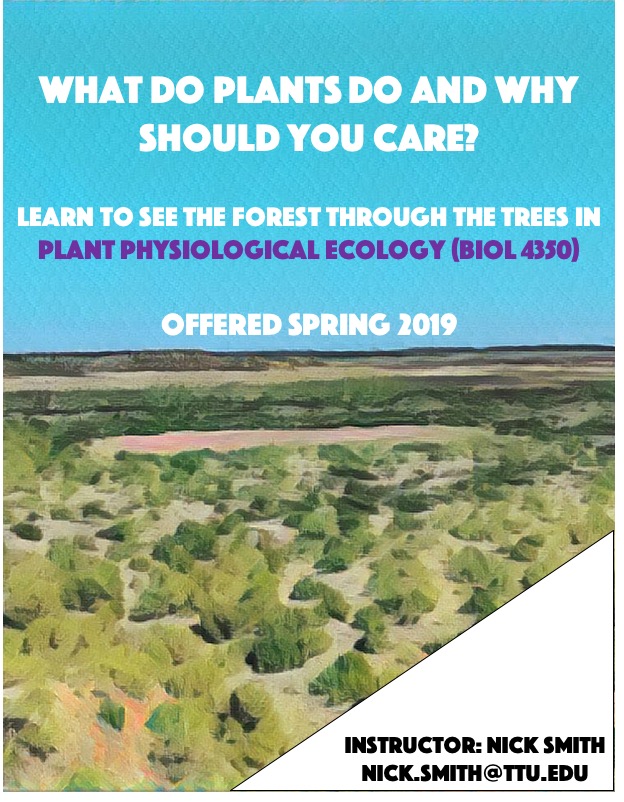Courses offered by Nick Smith at TTU
**We are beefing up the Botany curriculum at TTU. Check this ad for a list of Botany courses offered by the Biology department: Botany Courses.**
Plant Physiological Ecology (BIOL 4350/6350)
This course covers the fundamentals of plant physiological processes at
multiple scales, from the cellular to whole-plant level.
The class considers physiological responses to a variety of abiotic
and biotic conditions across space and time, including responses to expected future global changes.
We examine plant strategies that influence their form, function, and distribution.
The course considers both natural and agricultural contexts.
Students tackle classical literature as well as current topics in plant physiology.
Classes are primarily discussion based.
The course is part of a TTU-wide Creating Livable Futures initiative. The purpose
of the initiative is to create opportunities for students to hear and disseminate
information related to global sustainability.
Offered Spring of odd-numbered years.
Information and material for the Spring 2023 course can be found on the
course GitHub repository.

Special Topics - Principles of Terrestrial Ecosystem Ecology (BIOL 4316/5316)
Students in this course learn the fundamentals of ecosystem ecology.
This includes interactions between biological organisms and themselves as well
as their environment.
Concepts taught include water and energy cycling as well as carbon and nutrient
flows in natural and managed systems. This includes aboveground and belowground
processes. As ecosystem ecology is the largest scale of ecology, the class also
cover necessary concepts of individual, population, and community ecology.
Spatial extent of processes covered extends to the globe.
Temporal extent extends to millenia.
The class considers applied aspects of global change and human decision making.
Students are evaluated on their ability to discuss and disseminate course topics.
The course is part of a TTU-wide Creating Livable Futures initiative. The purpose
of the initiative is to create opportunities for students to hear and disseminate
information related to global sustainability.
Offered Fall of odd-numbered years.
Information and material for the Fall 2019 course can be found on the
course GitHub repository.

Biology of Plants (BIOL 1401)
This course, intended for students not majoring in biology, provides a broad survey of plant biology.
Students will be able to recognize major plant groups and their characteristics,
describe plant structure and its relationship to plant function, and associate the
survival of plants with expression of genes controlling plant function.
The course includes a lab section and satisfies university lab course requirements.
The lab for the course is designed as a course-based undergraduate research experience (CURE)
for all 144 students. The CURE is designed to teach students the nature of science
through carrying out and disseminating a research project examining the impact
of global change on plants.
CURE Lab Manual.
Offered every Spring/Fall and is taught by Nick in even-year semesters.
Spring 2022 Syllabus.
Plant Physiological Theory and Techniques (1 credit; BIOL 6100-029)
Students in this course will learn mechanistic theory and techniques commonly
used in the field of plant physiology. The course will focus on data acquisition
at scales from the organ to the whole-plant. Theory will be taught through reading
of primary literature, which will be combined with the teaching of techniques in the lab and field.
Offered every Spring semester.
Spring 2023 Syllabus.
Undergraduate Research in Plant Ecophysiology (1 credit; BIOL 4100)
As part of this research experience, undergraduates learn research techniques under
the supervision of Nick Smith and members of the Smith lab.
As a final project, students develop a proposal for a research project that will
(ideally) take place in a following semester.
Projects may involve, but are not limited to, laboratory, greenhouse, field, and/or computer simulations.
Offered every semester.
Fall 2018 Syllabus.
Undergraduate Research in Plant Ecophysiology (3 credits; BIOL 4300)
As part of this research experience, undergraduates design and carry out their own
research project under the supervision of Nick Smith and members of the Smith lab.
Projects may involve, but are not limited to, laboratory, greenhouse, field, and/or computer simulations.
Ideally, projects will follow from a proposal developed in a previous semester.
Offered every semester. This course is ideal for students that have either taken 4100 or have extensive training in botany, ecology, computer science, and/or statistics.
Spring 2018 Syllabus.